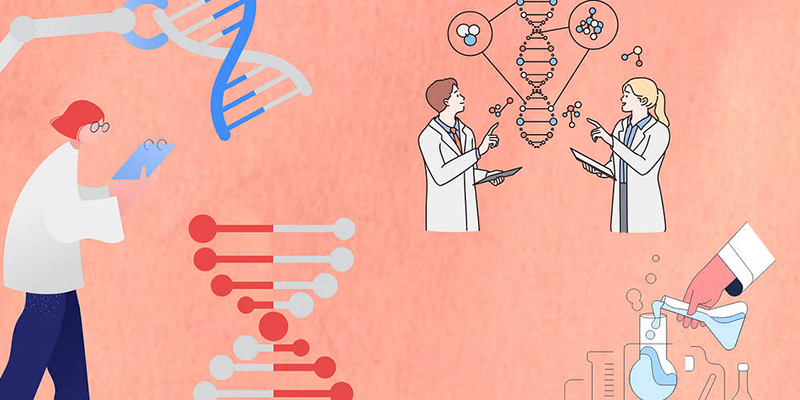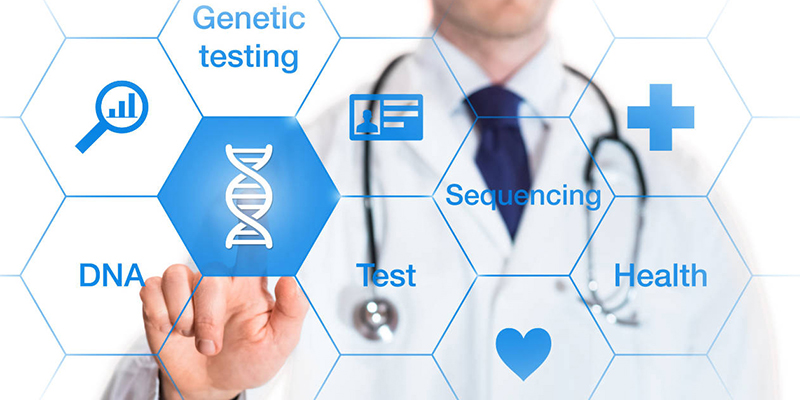Advertisement
Jan 01, 2000 By Nouman

Genetic testing has metamorphosed healthcare, offering profound insights into one's genomic blueprint. Recognizing the benefits of genetic testing can provide solace and potentially life-preserving information. This discourse delves into the multifaceted dimensions of genetic testing for health, elucidating how it works and its imperative role in anticipatory healthcare.

Benefits of Genetic Testing
Early Detection of Genetic Disorders
A paramount advantage of genetic testing is the intelligent identification of genomic anomalies. Individuals can implement prophylactic strategies to manage or prevent specific pathologies by discerning genetic mutations at a nascent stage.
- Identifies predisposition to hereditary maladies
- Facilitates early intervention and therapeutic measures
- Offers perspicacious insights into potential health hazards
Personalized Healthcare
Genetic testing for health facilitates a sui generis approach to healthcare. By deciphering an individuals genomic composition, medical practitioners can devise treatments and preventative strategies meticulously tailored to the patients unique requisites.
- Customized therapeutic regimens
- Enhanced comprehension of pharmacogenomics
- Optimized management of chronic afflictions
Family Planning
Genetic testing can benefit reproductive health for those contemplating progeny. It can unmask carriers of genetic pathologies, empowering prospective parents to make rational decisions.
- Detects carrier status for genetic disorders
- Informs reproductive choices
- Mitigates the risk of transmitting genetic disorders
How Genetic Testing Works
The Testing Process
Comprehending how genetic testing works entails several rudimentary steps. The procedure typically begins with procuring a specimen, followed by laboratory scrutiny to identify genetic polymorphisms.
- Sample collection (blood, saliva, or tissue)
- DNA extraction and sequencing
- Analysis of genetic polymorphisms
Interpreting Results
Genetic counsellors or healthcare providers interpret the genomic data post-analysis. This phase is pivotal in apprehending the ramifications of the findings.
- Elucidation of genetic variants
- Evaluation of health risks
- Recommendations for subsequent actions
Confidentiality and Ethical Considerations
Genomic data confidentiality is sacrosanct. Ethical considerations in genetic testing for health encompass informed consent, privacy, and the potential psychological sequelae of the results.
- Ensures patient confidentiality
- Informed consent process
- Addresses psychological ramifications
Real-Life Impact
Success Stories
Numerous individuals have experienced transformative outcomes thanks to genetic testing's benefits. These success stories underscore the significance of gene testing in contemporary healthcare.
- Early identification of oncogenic genes leading to preventative measures
- Diagnosis of rare genetic disorders and appropriate treatment
- Tailored medication regimens enhancing patient outcomes
Challenges and Limitations
Despite the myriad benefits of genetic testing, it is also crucial to acknowledge the challenges and limitations. Not all genetic tests can predict every conceivable health condition, and some results may necessitate further investigation.
- Potential for indeterminate results
- Limited predictive capability for certain conditions
- Necessity for ongoing research and innovation
Genetic Testing for Disease Prevention
Prophylactic Interventions
One of the transformative benefits of genetic testing is its potential to guide prophylactic interventions. Individuals can take preemptive actions to mitigate the onset of diseases by identifying genetic predispositions.
- Custom-tailored lifestyle modifications
- Preemptive medical treatments
- Systematic monitoring and early screenings
Nutrigenomics
Genetic testing for health has inaugurated new paradigms in nutrigenomics, elucidating how genes and nutrition interact. Understanding genetic markers can help contrive personalized diets that optimize health.
- Idiosyncratic dietary plans
- Detection of nutrient deficiencies
- Augmented metabolic efficacy
Genetic Testing and Mental Health
Predicting Psychiatric Disorders
Another significant benefit of genetic testing is its ability to predict susceptibility to psychiatric disorders. Early identification can lead to timely interventions and superior management.
- Identifies predisposition to depression and anxiety
- Custom-tailored mental health therapies
- Prophylactic mental health strategies
Pharmacogenetics in Psychiatry
Genetic testing for health can guide pharmacogenetics, ensuring that psychiatric medications are efficacious and have minimal adverse effects based on an individuals genetic profile.

- Personalized pharmacotherapy plans
- Reduction of adverse pharmacological reactions
- Optimized therapeutic outcomes
Genetic Testing in Oncology
Oncogenomics
Genetic testing for health plays a pivotal role in oncogenomics, the exploration of cancer-related genes. It elucidates the genetic underpinnings of cancer, leading to more precise treatments.
- Identification of oncogenic mutations
- Personalized oncological treatment regimens
- Early detection of hereditary cancers
Tumor Profiling
Genetic testing for health encompasses tumour profiling, where the genetic composition of a tumour is analyzed to guide targeted therapies.
- Precision medicine in oncology
- Custom-tailored chemotherapy and radiotherapy
- Enhanced survival rates
Genetic Testing in Cardiology
Cardiogenomics
The benefits of genetic testing extend to cardio genomics. Elucidating genetic factors that contribute to cardiovascular diseases enables early intervention and management.
- Detection of inherited cardiac conditions
- Personalized cardiac care regimens
- Prophylactic cardiology measures
Risk Stratification
Genetic testing for health assists in risk stratification, categorizing individuals based on their genetic risk for cardiovascular diseases.
- Targeted preventive strategies
- Systematic cardiovascular monitoring
- Lifestyle and pharmacological adjustments
Genetic Testing in Pediatrics
Neonatal Genetic Screening
Neonatal genetic screening is among the benefits of genetic testing, facilitating early diagnosis and treatment of genetic disorders in neonates.
- Early intervention in genetic maladies
- Personalized pediatric care regimens
- Enhanced long-term health outcomes
Developmental Genetics
Genetic testing for health can also focus on developmental genetics, identifying genetic etiologies of developmental delays and disabilities.
- Tailored educational and therapeutic interventions
- Early support and resources for families
- Optimized developmental trajectories
Ethical and Social Implications of Genetic Testing
Informed Consent
A crucial facet of genetic testing involves obtaining informed consent and ensuring individuals comprehend the implications of the test results.
- Transparent communication of risks and benefits
- Ethical considerations in testing minors
- Respect for patient autonomy
Genetic Counseling
Genetic testing for health is frequently accompanied by genetic counselling, providing support and guidance to individuals as they navigate their genetic information.
- Personalized risk assessment
- Emotional and psychological support
- Decision-making assistance
Future Prospects of Genetic Testing
CRISPR and Gene Editing
The future of genetic testing for health is interwoven with advancements in gene editing technologies such as CRISPR, which hold promise for rectifying genetic mutations.
- Potential to cure genetic disorders
- Ethical considerations in gene editing
- Long-term implications for human health
Technological Advancements
Technological progress continues to refine how genetic testing works. The future portends more precise, accessible, and cost-effective genetic testing modalities.
- Next-generation sequencing technologies
- Integration with electronic health records
- Enhanced accessibility and affordability
Expanding Genetic Databases
The expansion of genetic databases will continue to evolve how genetic testing works, augmenting its accuracy and scope.
- Enhanced genetic research
- Better elucidation of rare diseases
- Broader applications in personalized medicine
Conclusion
In summation, the benefits of genetic testing are profound and multifaceted. From early detection and personalized healthcare to informed family planning, genetic testing for health is an indispensable tool in modern medicine. Understanding how genetic testing works is crucial for maximizing its potential and ensuring ethical and productive use. Embracing genetic testing can lead to superior health outcomes and, ultimately, save lives.
-

Medical Robotics: Transforming Surgeries And Rehabilitation
Sep 09, 2024
-

Contrast Therapy: How Alternating Hot And Cold Is Shaping Recovery
Sep 09, 2024
-

Why Genetic Testing Can Save Your Life
Jan 01, 2000
-

Current Legislative And Regulatory Changes In Healthcare
Aug 27, 2024
-

What Makes Medicinal Mushrooms the Hottest Health Trend?
Aug 28, 2024
-

Who Needs to Consider Functional Medicine?
Jan 01, 2000
-

Why Are Bodycare Innovations Stealing the Spotlight from Facial Skincare?
Aug 28, 2024
-

How Digital Health Tools Are Changing The Healthcare Landscape
Aug 27, 2024
-

The Importance Of Doctor Recommendations In Consumer Health Decisions
Aug 27, 2024
-

How Can You Enhance Sleep Hygiene with Tech and Tips?
Aug 28, 2024
-

What Tech Tools Can Help Improve Your Sleep Quality?
Sep 09, 2024
-

How is AI Revolutionizing Healthcare Diagnostics in 2024?
Aug 28, 2024
-

What Are The Benefits Of Personalized Medicine For Patients?
Aug 27, 2024
-

How Can Everyday Gear Perform Medical Tests At Home?
Sep 09, 2024